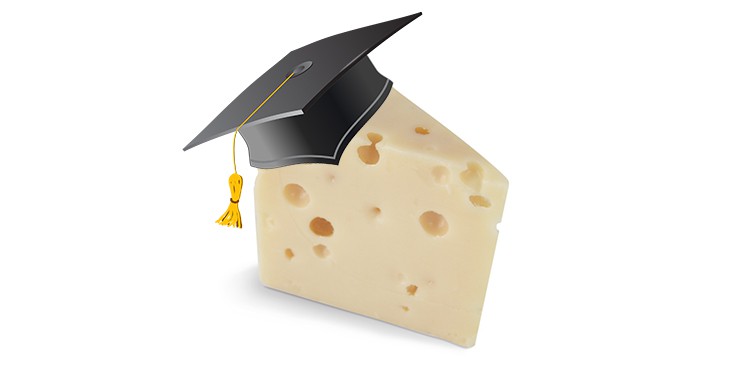
As I’ve been preparing to leave culture behind, I’ve been thinking a lot about my internship and everything I got out of it. I learned way more about cheese than I ever thought I’d know. While I’m still far from being an expert in any definition of the word, I’ve become something of a cheese guru in my friend group. I spend so much time talking about what I now know about the process of making cheese, eating cheese, cutting cheese, etc. that I wanted to spend some time on the slightly more metaphorical things cheese has taught me about how to live. So, I’d like to do a little bit of that and sign off with a small list of reflections.
Appreciate everything for the size and shape it comes in. I knew there was a lot of cheese in the world before I started here, but I had no idea just how much. There are tiny little wheels of cheese that clock in at less than three pounds, and enormous wheels that can hit 100 pounds. Cheese can be wheels, cylinders, weird teardrop shapes, tiny mounds, and a bunch more. You have to learn to love the diversity of cheese, and the world around you, and appreciate how everything is different. Just because I love a good aged cheddar, doesn’t mean every cheese in the world should be a cave-aged cheddar. Sometimes, I have to get smacked in the face with a particularly strong blue. It’s the spice of life.
Don’t try to make a cheese into something its not. To tack onto the last realization, you not only have to appreciate variety, but accept a cheese for what it is. Take fresh chèvre as it is and don’t expect it to be something else. You have to approach cheeses on their own terms. Sometimes, I don’t want the earthy flavor, but the earthy flavor it what makes that cheese what it is. Learn to embrace it, even if you don’t want to eat it.
Try new things—even if you think you might not like them. I came into this internship pretty solidly convinced that I didn’t like blue cheese. Some of this had to do with the fact that I’d had a lot of really strong blue cheeses in the past. Exploring the whole spectrum allowed me to start appreciating stronger and milder versions. If I hadn’t told myself to try cheeses with an open mind every week, I might have never discovered that Roquefort is actually delicious. New tastes aren’t always good, but hey, at least you tried.
Don’t be a snob. Sometimes when writing for a cheese publication, it can be tempting to think about the fancy artisan cheeses and start judging them as more worthy of attention. But here at culture we really try to allow all cheeses to stand on their own merits. Sometimes it’s okay to love Velveeta. You don’t always need something you can only find at specialty cheese shop. Love what you love, and don’t worry whether anyone’s judging you for it.
Accidents happen. Often, they’re happy. A lot of cheeses came about by sheer accident. If we think about the first cheese and how it was essentially the result of weather and milk storing methods, cheese might have never happened at all (let’s all give thanks to our first intrepid ancestor for trying their curdled milk). The cheesemaking process can be unpredictable, and people make mistakes. Sometimes that makes for the best discoveries.
Everything has taken a path to get to where it is today. I studied a lot of cheese history the past several months and have learned that some cheeses are the result of hundreds of years of growth and experimentation. When you see what a cheese is today, try to see where it was a hundred years ago or two hundred years ago. That might help you understand anything, really.
The things you might not expect can make some pretty big statements. Cheese has been used for some surprising stuff in the past. Dairy sacrifices were part of the one of the first religions. Andrew Jackson used a big block of cheese as way to start civil discourse. Thomas Jefferson once was gifted a 1,000 pound wheel of cheese as a statement of democracy. Some things might seem unassuming but mean more than you expect.
There’s no end to the ways to fit cheese creatively into your meal. All right, so this one doesn’t really have a deeper meaning. Cheese is just incredibly versatile and go with about anything. Think about the next time you’re planning dinner. What new cheese can you use this time?
That’s what it’s really all about.
Feature Photo Credit: culture + “Education cap…” by Fyuriy | Shutterstock



